Graham Hancock Might Be My New Favorite Person
We may be shifting into a new renaissance of freethinkers, which is why the establishment is nervous about an archeology documentary.
Back in the nineties I worked in a retail bookstore. Terrible work if you can find it, but I did have my finger on the pulse of what people were reading at the time. (Yes, people read books back then. And for the most part society was intelligent and civil—I don’t think it’s unrelated.) Mostly it was Grisham, The Green Mile, Angela’s Ashes, “For Dummies” books, and the like.
But I also remember selling an unholy crap-ton of this strange, fat little tome called Fingerprints of the Gods.
I was curious about it. I knew many of the reigning theories of Egyptology and ancient civilizations were unsatisfying, to say the least. For example, just exactly what the holy hell are those pyramids? They sure aren’t pharaohs tombs or whatever the hell we’re supposed to believe.
But interested though I was, Fingerprints just tripped too many of my skeptical alarms at the time. I put it down and forgot all about Graham Hancock for about twenty years or so.
Then he started showing up on Joe Rogan. I don’t always agree with Joe but I respect his tenacity—he’s not soft on guests. He rarely lets them get away with wild theorizing and bullshitting backed with little evidence. He challenges them.
If he’s had Hancock on six or seven times, I want to know why.
I listened to the Nov 10th show and was both intrigued and delighted.
Graham is an intelligent, forthright, well-spoken chap. He’s got a ton of energy and he seems even further energized by his critics, which is always a delight to see.
His series Ancient Apocalypse on Netflix is a hit, and has caused something of a stir.

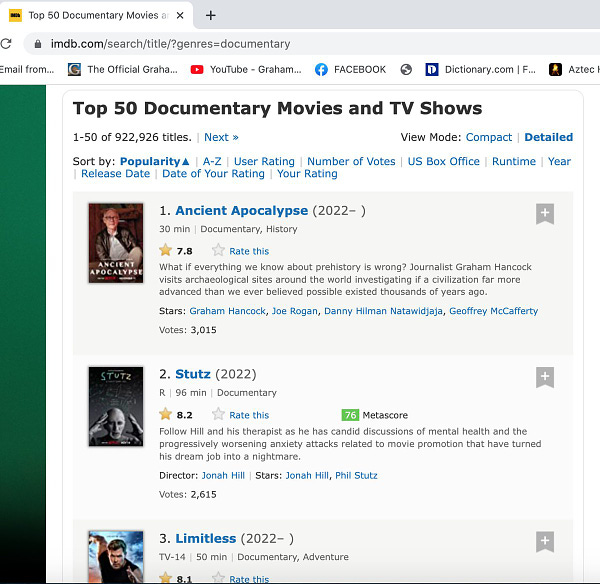
Which is curious to me. A hit? Really? An eight-part documentary series about pyramids and comets and tidal waves?
I find his theories intriguing, if at times, thinly supported. The flood myths that exist in nearly every culture on the planet are fairly undeniable. Something big and cataclysmic happened, big enough to be a global event that was spoken of for thousands of years, right up to the present day. The Younger-Dryas impact hypothesis is as good an explanation for it as I’ve ever heard. And the ancient structures around the world—which are not only much older in many cases than was previously thought, but also, we now know, built on top of even older structures beneath them—all speak of civilizations that pre-existed our notion of the “oldest” civilzation, some six thousand years ago.
I find much of this compelling.
Where Graham is on a little bit of thin ice, I think, is his story about the survivors of the ancient civilization traveling around the world to teach all the primitive hunter-gatherer people how to do mathematics and grow crops and make advanced structures, and the like. It seems improbable, and though there might be some textual evidence for these visitors, it’s pretty thin.
But more broadly, I agree with Graham that we live in a fog of ignorance about our distant past. As he puts it, we suffer from species-wide amnesia.
We assume, from our biased, modern view, that all humans must have been primitive-hunter gatherers right up until us. We assume we know everything there is to know about our distant past. We assume we are the height of civilization, the pinnacle of evolution. We assume there could not possibly have been older, and even advanced, civilizations which collapsed. We assume there should be evidence of them that we could see. Graham’s points are…
there is evidence, in older-than-previously-thought structures around the world;
there is textual evidence of older civilizations; and…
something as globally devastating as the Younger-Dryas impact, and time, would have annihilated everything else.
I find this compelling enough to warrant further thinking and investigation, even if Graham’s conclusions are dead wrong.
As with so many things in our world, the official story is clearly false, regardless of whatever else we might theorize in its place.
And the zeal with which its defenders insist on the official story is highly suspect.
Which might give a clue as to why the Ancient Apocalypse series is being described as “dangerous”, and that it should not have been allowed to be aired, such as in this Guardian article:
The article ends with:
“That’s the danger of a show like this. It whispers to the conspiracy theorist in all of us. And Hancock is such a compelling host that he’s bound to create a few more in his wake. Believing that ultra-intelligent creatures helped to build the pyramids is one thing, but where does it end? Believing that election fraud is real? Believing 9/11 was an inside job? Worse? If you were feeling particularly mean-spirited, you could suggest that Netflix knows this, and has gone out of its way to court the conspiracy theorists.”
Of course, by now, we all know “conspiracy theorists” is simply code for: those who question things, or critical thinkers.
In short, it’s not that Graham’s theories are particularly dangerous in and of themselves. What is “dangerous”, in his critics’ minds, is that such thinking encourages questioning of conventional narratives, and skepticism towards authorities and experts.
In other words, the critics of the show don’t give a flip about the archaeology. They’re afraid of people becoming freethinkers.
This is why Graham might be my new favorite person. He is clear on the importance of questioning the powers-that-be and thinking for oneself.
Here’s what he had to say on Joe’s podcast, around the 52-minute mark:
“Let’s stop focusing all our efforts on fighting one another and hating one another and filling the world with anger and fury and let’s work together as a human species to make life on this planet better for everybody. That’s what’s going on now. There’s a new mindset which is coming into force. I celebrate the youth of our society today because they are refusing to be bound by the orders that are given to them by the powers that be. There’s a new spirit of thinking for ourselves. And that new spirit in my view, is going to change everything.”
One of those rare and delightful moments in a podcast where I find myself applauding out loud.
I think Graham is a little too generous with his praise for “young” people, since many young people today, along with everyone else, have been unfortunately brainwashed into fear and compliance and authoritarianism. But as far as a “new mindset coming into force” I believe he’s right on the money.
Here’s Graham again, a little further into the podcast:
“It seems like a dark time right now, lot of stuff is going on. That’s always the case when you’re in the middle of a paradigm shift. It seems like a dark time, but we’re privileged to live at this time, because two, three hundred years from now, this time is going to be looked back on as a turning point in the human story…
“One thing I do know for sure is that the whole covid and vaccine issue has been deliberately, carefully used by governments. They’ve taken advantage of it to inculcate and encourage a habit of obedience in the population—that we just kind of automatically say yes. That’s part of the controlling powers in our society fighting back against this tendency to individuality and to thinking for ourselves. That’s why I say we live in the middle of a paradigm shift. We’re in struggle right now. Either one side or the other is going to win. But I believe the force of good is a real force, and that the ability to think freely and think independently that the younger generation is showing is going to triumph in the long run.”
Yes, yes, and YES.
What we’ve all been through over the past 2.8 years feels like authoritarianism’s last gasp. One last desperate attempt to close its fist on humanity, now or never, or it will be an age of revolution in thought and institutions, where much of the old guard—academia, banking, government, media, corporations—who have kept us more or less under their thumb for generations, will come crumbling down under the weight of our critical and questioning minds.
Cue the Great Awakening.
Bring it on, I say. And so does Graham Hancock.
A lot of Ancient Apocalypse is intriguing and a lot is wildly speculative. But the deeper point the series makes, over and over, is this: one should not simply accept the conventional narrative, particularly when that narrative is being closely guarded by so-called authorities and experts who have an interest in maintaining it.
One should question authority, question so-called “expertise”, and think for oneself.
Matt Walsh sums it up nicely:
“I don’t personally buy much of what [Graham Hancock] is selling. I am not persuaded. And yet, I very much enjoyed this series, just as I’ve enjoyed him explaining his theories during his several appearance on Joe Rogan’s podcasts. I’ve read one of his books. I found it interesting. I think his theories are quite interesting, and entertaining, and also outlandish, and probably dead wrong. Despite what you’ve been told, it is possible to have this opinion about someone or something. It is possible to believe that someone is wrong and yet still find them fascinating. It is possible to disagree with someone’s ideas and yet still believe the ideas are worth listening to.”
“He is an outside-the-box thinker, and I can personally always appreciate those types of people. We need more of those people in the world, not fewer.”
And to attack an outside-the-box thinker, simply for being outside-the-box, reveals much about the attacker. This puts me in mind of Carl Sagan admonishing the scientific community for its handling of the “The Velikovsky Affair” (when scientists got rankled and threatened by another wild theorist):
“The worst aspect of the Velikovsky affair is not that many of his idea were wrong or silly or in gross contradiction to the facts. Rather, the worst aspect is that some scientists attempted to suppress Velikovsky’s ideas. The suppression of uncomfortable ideas may be common in religion or in politics, but it is not the path to knowledge, and there is no place for it in the endeavor of science.”
—Carl Sagan, Broca’s Brain
That Ancient Apocalypse is a hit reveals this to me: Hancock has tapped into a growing consciousness, an awareness, a mindset as he puts it, that hungers for questioning authority and official narratives.
And who can blame us for having that mindset?
We are about fed up to the back teeth of being told, as though to children, thou must believe it because I sayeth so.
Even if you don’t agree with a single conclusion Hancock puts forward, you have to admire his method: question the official narrative, find what is unconvincing about it, dig deeper, and think, not about what the experts say, but what makes sense to your reasoning mind.
And this mindset of questioning official narratives (if the title of the newsletter didn’t give it way) is what I think the world needs more desperately than anything else.
I agree with Matt Walsh. We need more Graham Hancocks in the world, not fewer.




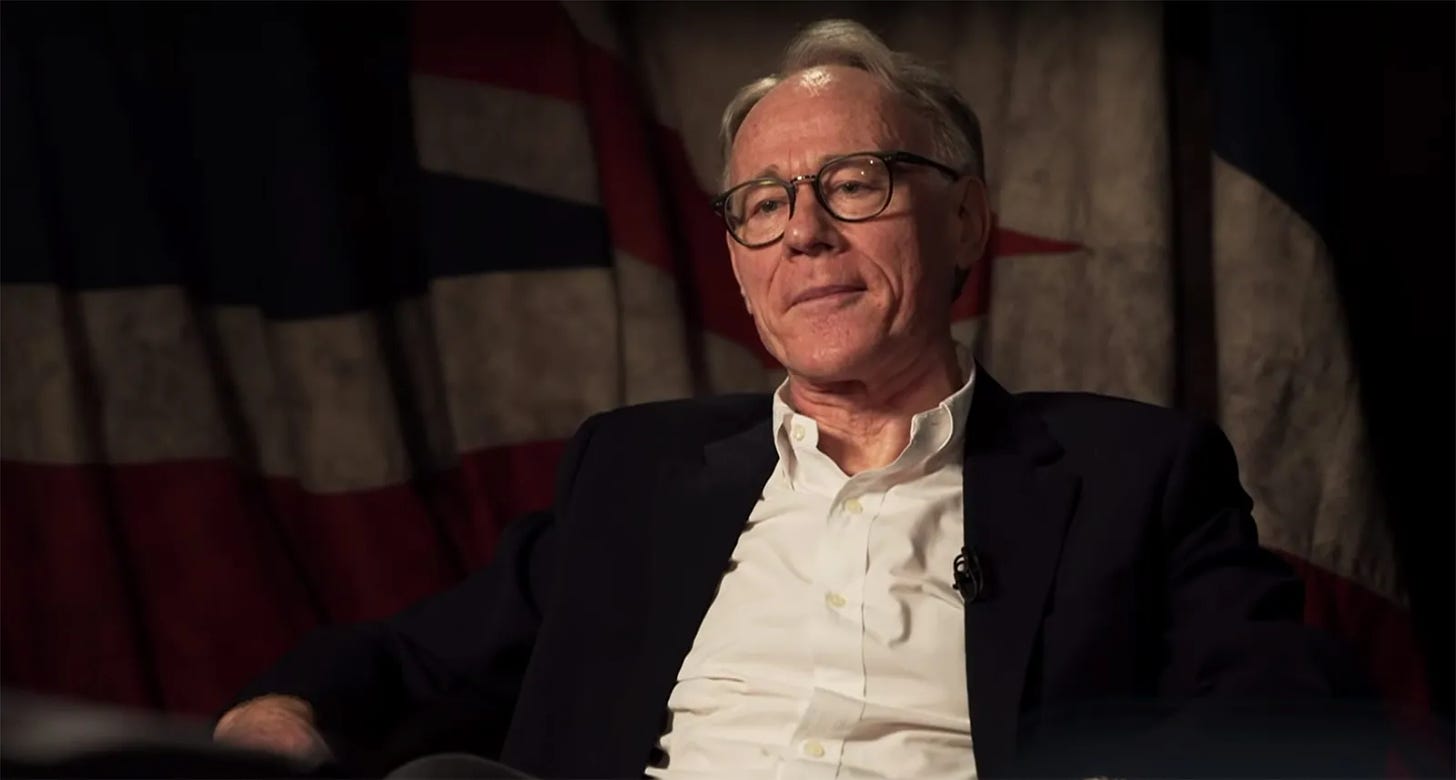
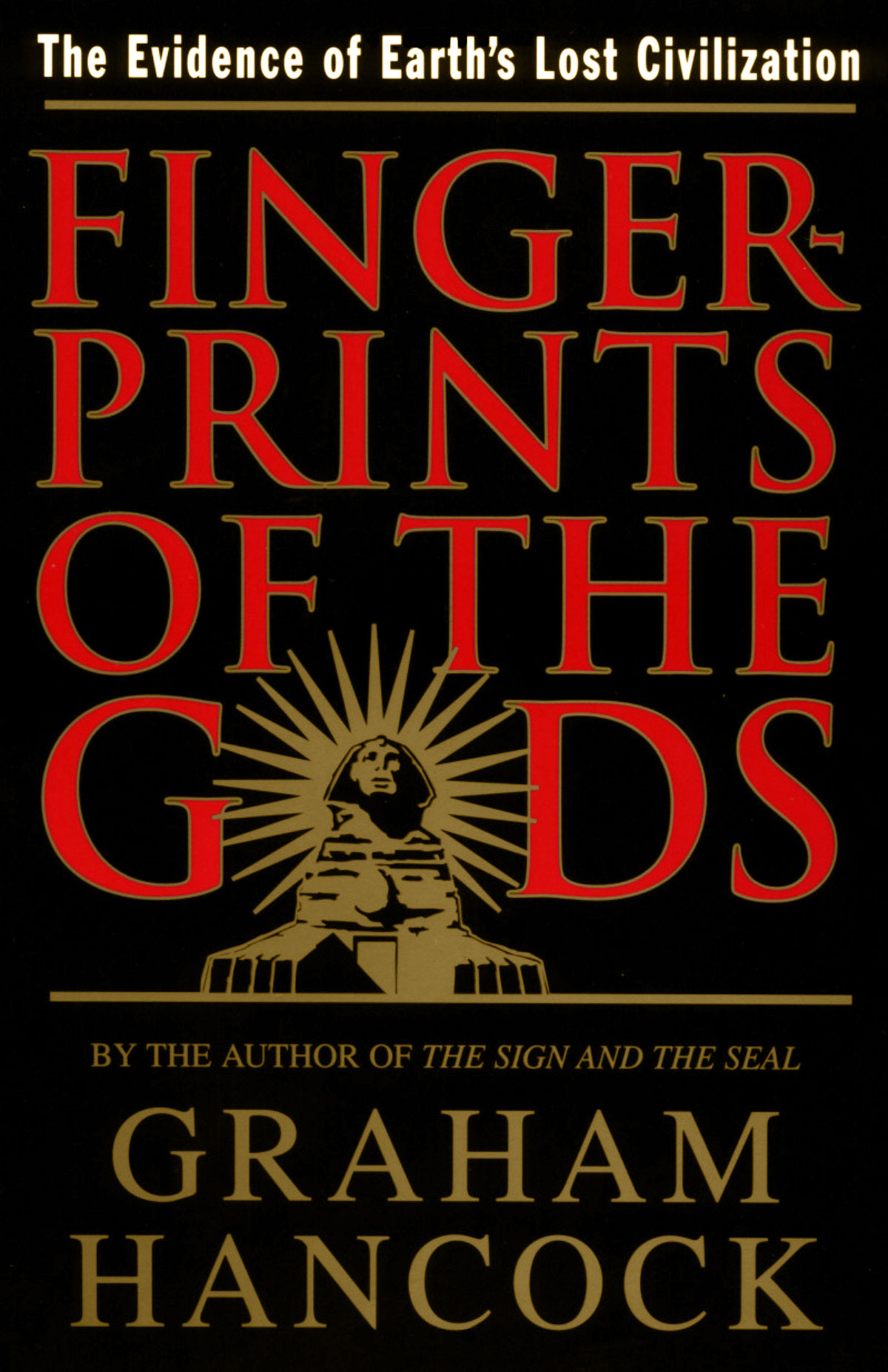
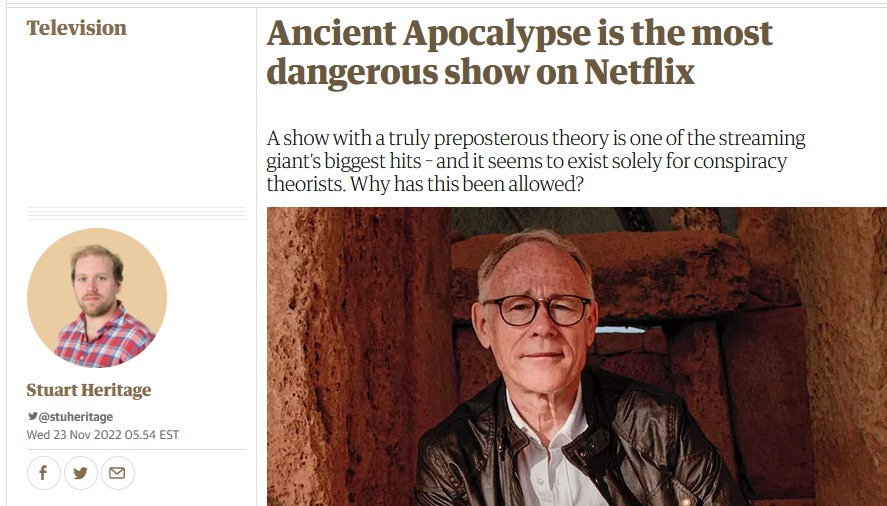


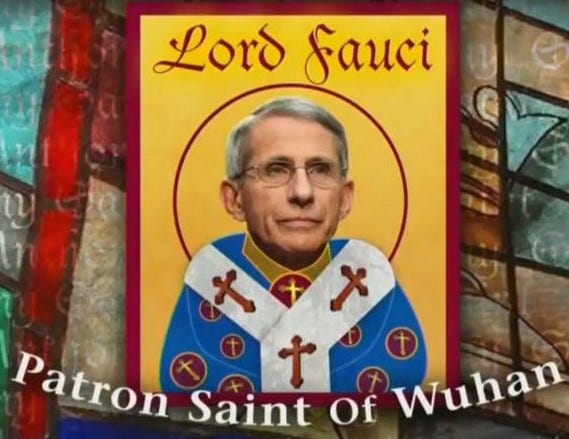
Yes, I found Ancient Apocalypse and his appearances on Joe Rogan compelling and I was cheering on him when he was talking about the status quo, and academia. There is another good recent podcast with him and Aubrey Marcus. The guardian does seem to give the game away about why the negative reaction - because they don't want people thinking for themselves. This is a wider issue which seems to pervade all of academia https://garysharpe.substack.com/p/the-ebony-tower
I Like Graham and Randall but have you seen Suspicious Observers on YouTube